A Vegan Meat Company Purged Its Pro-Union Employees. Workers Say an Anti-Union Drive Prompted The Firings.
The Appeal
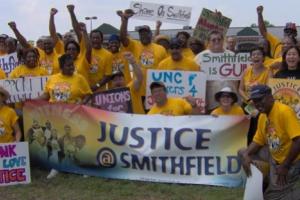 It was clear to us in the Justice@Smithfield campaign that you could not win relying solely on worker meetings and house visits or relying on solidarity in the community. We had to had to build visible activity inside the plant. Having workers see one another in collective action, not being fired and even winning things is how the union takes on a living presence.
It was clear to us in the Justice@Smithfield campaign that you could not win relying solely on worker meetings and house visits or relying on solidarity in the community. We had to had to build visible activity inside the plant. Having workers see one another in collective action, not being fired and even winning things is how the union takes on a living presence.
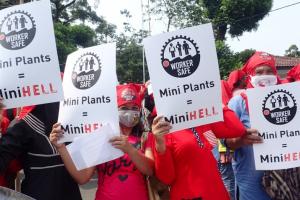 Phillips Seafood is a Baltimore-based company famous for its crabs. Global and US unions want to make it infamous for its treatment of low-paid women workers. Phillips moved its Indonesian production from urban to rural mini-plants in order to inhibit access to labor law protections and unionization efforts. Closer to home, the company is a major opponent of attempts to raise the minimum wage.
Phillips Seafood is a Baltimore-based company famous for its crabs. Global and US unions want to make it infamous for its treatment of low-paid women workers. Phillips moved its Indonesian production from urban to rural mini-plants in order to inhibit access to labor law protections and unionization efforts. Closer to home, the company is a major opponent of attempts to raise the minimum wage.
 To regain lost wages and benefits, UFCW Local 400 used political power, working with union, community, and faith allies to win minimum wage increases and paid sick days in much of the area the union represents. The local also mobilized its membership. Conferences that brought together nearly 300 Safeway and Giant stewards were followed by mass meetings and in-store action teams. The result was a victory and a commitment to keep up the pressure.
To regain lost wages and benefits, UFCW Local 400 used political power, working with union, community, and faith allies to win minimum wage increases and paid sick days in much of the area the union represents. The local also mobilized its membership. Conferences that brought together nearly 300 Safeway and Giant stewards were followed by mass meetings and in-store action teams. The result was a victory and a commitment to keep up the pressure.
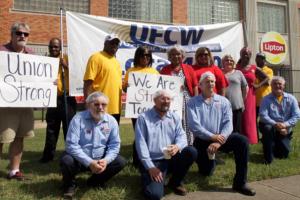 Lipton brings tea from around the world through the Port of Virginia. At its single 20-acre plant in nearby Suffolk, 200 workers roast, blend, package, and warehouse it, producing over 6 billion bags a year. For years on end, these workers have been “drafted”—the company’s term for forced overtime—into working 13 straight days out of every 14.
Lipton brings tea from around the world through the Port of Virginia. At its single 20-acre plant in nearby Suffolk, 200 workers roast, blend, package, and warehouse it, producing over 6 billion bags a year. For years on end, these workers have been “drafted”—the company’s term for forced overtime—into working 13 straight days out of every 14.
 A transnational coalition of labor unions and community groups in the United States and Mexico charged multinational retail corporation Chedraui Commercial Group with violations of municipal, federal, and international labor law on November 12, filing unprecedented dual claims under compliant mechanisms embedded within the North American Free-Trade Agreement (NAFTA) and Organization for Economic Cooperation and Development (OECD).
A transnational coalition of labor unions and community groups in the United States and Mexico charged multinational retail corporation Chedraui Commercial Group with violations of municipal, federal, and international labor law on November 12, filing unprecedented dual claims under compliant mechanisms embedded within the North American Free-Trade Agreement (NAFTA) and Organization for Economic Cooperation and Development (OECD).
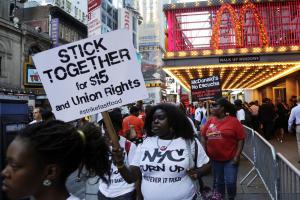 With 1.3 million U.S. employees—more than the population of Vermont and Wyoming combined—Walmart is by far the nation’s largest private-sector employer. It’s also one of the nation’s most aggressive anti-union companies, with a long history of trying to squelch unionization efforts. “People are scared to vote for a union because they’re scared their store will be closed,” said Barbara Gertz, an overnight Walmart stocker in Denver.
With 1.3 million U.S. employees—more than the population of Vermont and Wyoming combined—Walmart is by far the nation’s largest private-sector employer. It’s also one of the nation’s most aggressive anti-union companies, with a long history of trying to squelch unionization efforts. “People are scared to vote for a union because they’re scared their store will be closed,” said Barbara Gertz, an overnight Walmart stocker in Denver.
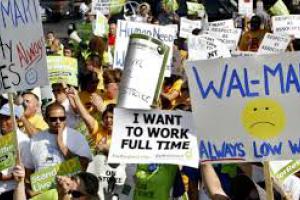 With 1.3 million U.S. employees—more than the population of Vermont and Wyoming combined—Walmart is by far the nation’s largest private-sector employer. It’s also one of the nation’s most aggressive anti-union companies, with a long history of trying to squelch unionization efforts. “People are scared to vote for a union because they’re scared their store will be closed,” said Barbara Gertz, an overnight Walmart stocker in Denver.
With 1.3 million U.S. employees—more than the population of Vermont and Wyoming combined—Walmart is by far the nation’s largest private-sector employer. It’s also one of the nation’s most aggressive anti-union companies, with a long history of trying to squelch unionization efforts. “People are scared to vote for a union because they’re scared their store will be closed,” said Barbara Gertz, an overnight Walmart stocker in Denver.
Spread the word